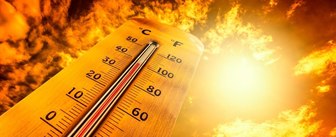Nearly a third of Americans (31%) in the latest Economist/YouGov poll experienced 100-degree heat in the last week; one in four (26%) felt the effects of the Western wildfires. About half of Westerners experienced each of these weather phenomena (53% and 47%, respectively), but a significant percentage in every region of the country felt these impacts, too.
Last week there were air quality alerts issued all over the country because of the fires, and there were high temperatures nearly everywhere. But there is also a political dimension in reports of weather problems. While essentially the same share of Republicans (29%) and Democrats (33%) reported feeling the heat last week, Republicans (21%) were less likely than Democrats (32%) to report any effect from the California wildfires.
Partisanship has consistently been part of how the public views climate change: Democrats are more likely to believe it exists and that humans have had a role in causing it, and they are also more willing to believe governments can do something to slow it down. Seven in 10 Democrats (72%) say governments and countries can take actions that will significantly slow the speed of climate change, compared to 24% of Republicans.
More than eight in ten Democrats (82%) and half of Independents (49%) believe the global climate is changing as a result of human activity, something only one in four Republicans (27%) agree is taking place. However, just 12% of Republicans deny that climate change is occurring at all. There is little difference in partisan views on climate change whether or not someone personally experienced the wildfires or the heat wave.
Republicans are much less likely than Democrats and Independents to attribute recent weather phenomena to climate change. Half – or nearly half – the overall public believe global sea level rise (55%), recent heat waves (49%) and droughts (47%) are due to a changing climate. Nearly as many attribute the wildfires (45%), the recent Texas cold snap (43%) and severe hurricanes (43%) to that. Republicans are only half as likely as the public overall to see these events as climate change-related.
Majorities of Republicans call each of these weather events things that “just happen from time to time.”
Three in five Americans who were personally affected by the Western wildfires (61%) say that those fires were, in fact, a result of climate change, 21 points more than those not personally affected. The pattern exists, at different levels, among Democrats (a 10-point difference), Republicans (an 11-point difference) and especially among Independents (a 24-point difference).
There was a similar (though smaller) impact of having felt 100-degree temperatures last week and seeing a link to climate change in the Pacific Northwest heat wave.
While many believe that humans have had a role in creating climate change, many are also optimistic that humans can change that. Among the 59% who expect they will feel the effects of climate change personally in their lifetimes, seven in ten believe governments can take actions that will significantly slow its speed, and even more (82%) say humans themselves can have at least a reasonable impact slowing climate change.
See the toplines and crosstabs from this Economist/YouGov poll
Related: One in 12 unvaccinated Americans say $100 would change their mind about the COVID-19 vaccine
Methodology: The Economist survey was conducted by YouGov using a nationally representative sample of 1,500 US Adult Citizens interviewed online between July 24 - 27, 2021. This sample was weighted according to gender, age, race, and education based on the American Community Survey, conducted by the US Bureau of the Census, as well as 2016 Presidential vote, registration status, geographic region, and news interest. Respondents were selected from YouGov’s opt-in panel to be representative of all US citizens. The margin of error is approximately 2.9% for the overall sample.
Image: Getty










